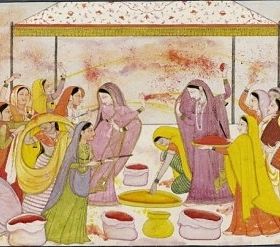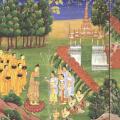16. Better Half: Women in Ancient India
Women philosophers and ideas about women in Buddhism, the Upanisads, and the Mahabharata.
Themes:
• B. Black, “Draupadī in the Mahābhārata,” Religion Compass 7 (2013), 169-78.
• K.R. Blackstone, Women in the Footsteps of the Buddha: Struggle for Liberation in the Therīgāthā (Delhi: 1998).
• S. Brodbeck and B. Black (eds), Gender and Narrative in the Mahābhārata (London: 2007).
• J. Fitzgerald, “Nun Befuddles King, Shows Karmayoga Does Not Work: Sulabhā’s Refutation of King Janaka at MBh 12.308,” Journal of Indian Philosophy 30 (2002), 641-77.
• A. Hiltbeitel, The Cult of Draupadī, 2 vols (Chicago: 1988, 1991).
• S.E. Lindquist, “Gender at Janaka’s Court: Women in the Bṛhadāraṇyaka Upaniṣad Reconsidered,” Journal of Indian Philosophy 36 (2008), 405-26.
• P. Olivelle. “Amṛtā: Women and Indian Technologies of Immortality,” Journal of Indian Philosophy 25 (1997), 427-49.
• S.J.M. Sutherland, “Sītā and Draupadī: Aggressive Behavior and Female Role-Models in the Sanskrit Epics,” Journal of the American Oriental Society 109 (1989), 63-79.
• R. Vanita, “The Self is Not Gendered: Sulabha’s Debate with King Janaka,” NWSA Journal 15 (2003), 76-93.

Origins


 ..
..



Comments
Christianity in India
As this series progresses into a different period in Indian thought and medieval philosophy also continues on, I had a sudden thought. Traditionally, Christians have been in India since the extremely early days of the religion. I'm curious, while we see obvious philosophical works produced as Buddhists, Jains, and Hindus interact, are there any works that we have that deal with Christianity? I suppose the religion may have just been too minor and geographically localised to consider, but even so I'd think the Christians themselves might have had something to say. It's a question that I've never heard mentioned, indeed, I would never have thought to ask if not for the Indian and Medieval philosophy sections running concurrently.
In reply to Christianity in India by Emma
Christians and India
That's an interesting question. I don't know the answer - I suspect we wouldn't get references to Christians in Indian literature until much later, but perhaps an Indologist will see your comment and say otherwise. Much, much later Dara Shikoh does refer to the New Testament; I mention that in passing in episode 189, but of course that's well into the period of Islamic rule in India.
In reply to Christianity in India by Emma
Christians in India
Yes, interesting question. As you say, the community was extremely small and geographically localised, so that (as far as I know) it seems that other Indians became aware of Christianity only after the Portuguese and the missionaries arrived on the subcontinent ---very much as it happened with other neglected minorities, such as the Parsi (Zoroastrian) one and the Jew one. It might be interesting to look at Christian documents in Malayalam or in any other South Indian language, if there are any of the pre-colonial time.
Good effort, but..
...it would be nice if the speaker at least has proper pronunciation of the words he is using, and also throws light on actual meanings of words used. :) Furthermore, it would be good to cite sources, and if "further reading" are the only sources used, then it seems a deeply biased (and very small) collection of works/articles. It's perhaps unfair to point out, but the authorship itself renders them somewhat circumspect, given how cultural context and nuances of language which might be critically important in understanding philosophical discourse may be altogether missed.
All in all it's nice to see an effort being made to explain philosophies of many cultures through succinct audio recordings which seem within reach and understanding of the lay person, but qualifying notes about the biases inherent in subjective interpretations from individuals, and helpful guidance to the *original* texts and literature to allow people to exercise their own better judgment about their content and implications, and the global context under which they exist, would make this a far more honest, transparent, and well-meaning academic endeavour.
In reply to Good effort, but.. by Fang
Primary texts etc
Have you looked at the other episodes in this series? The majority do give references to primary literature (in translation), this episode is a bit of an exception since it is not about one text or author but very wide-ranging. (Though actually now that I think about it, I believe that Fitzgerald's piece is actually a translation of the relevant primary text.)
We have referred extensively to work by scholars India if that is what you mean by "the authorship renders them somewhat circumspect" (I guess you mean "suspect," not "circumspect"?). We've also had guests of indian extraction or from India on as interview guests.
I'm sure you are right on the pronunciation though; that was one thing that gave me pause about embarking on a series about Indian thought. But I decided, better to include India with bad pronunciation than not at all. Wait until we get to China, if we do - that will be a real disaster! Anyway the main thing from my point of view is that I have Jonardon's guidance in writing the scripts and hence the book based on the series, and he does know Sanskrit, unlike me.
Women in Hindu Phiolosophy
Kindly post me the soft copy of, " Women in ANcient India"
In reply to Women in Hindu Phiolosophy by MALOBIKA KARANJAI
Written version
Thanks for your interest! I don't distribute copies of scripts (see FAQ below) but this will be included in the book version which will be out early in 2020, it seems.
16. Better Half: Women in Ancient India
When implanting her mind into King Janaka's body, she mentions that she her responses will be "adapted to her audience" so ,to my understanding, rather than having her speech filtered through the agency of this man, Sulabha's discourse is filtered for his understanding, especially seeing how poorly he did on delivering his own speech.
I find this podcast an interesting starting point for conversation about women and godesses in India, yoga, gender and philosophy. Thank you.
Add new comment